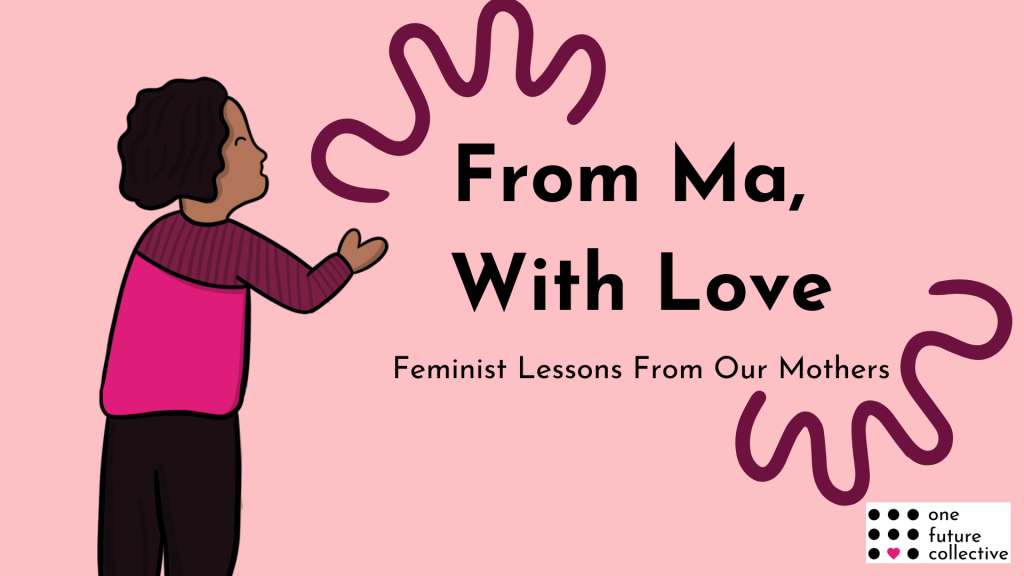From Ma, With Love is a campaign celebrating recollections of feminist tales and lessons, passed down to us by our mothers, this Mother’s Day. The first edition of this compilation has 16 heartwarming stories. ‘The Freedom to Choose’ by Vandita Morarka is the fifteenth story in this series. You can download the entire publication here.
I grew up in a huge Marwari joint family. With that, came the expected norms for how ‘a young Indian woman is supposed to be’. It wasn’t till I hit my teen years that I realised how revolutionary my mother was, how she had battled the misogyny so deeply ingrained in everyone around her to create a space for me to build a life I wanted. Of how she had made small choices everyday and fought her fears to help my brother and I become the people that we are today.
I’m going to break away from one of the lessons that she’s passed down to me, that productive work can only happen if you first make a list for it.
On caring enough for others to fail but keep trying. To get me admitted into a reputed school when I was 3 years old, my parents had to go through an interview. One criteria for the admission was that one of the parents should speak fluent English; while my mother speaks Hindi beautifully, she wasn’t very confident with her English. She went into the interview thinking my father speaking English would be adequate. However, that day dad didn’t speak much at the interview and my mother had to wing the interview all by herself. At the end of the interview, she apologised to the interviewers and reassured them that my father spoke perfect English so it wouldn’t be an issue for me later. They admitted me, but they told my mother that I was getting admission only because they couldn’t deny a child admission when their mother cared so deeply about her education. When I was 6, my class teacher told my mother that I wasn’t able to speak English very well, if at all, and my mother spent the next several years ensuring that my teacher was proven wrong. During a convocation speech I was delivering, I could see her cry in the audience. She later told me it was because I spoke English so fluently.
On why every woman needs enough money to say ‘fuck off’.
I’ve been brought up on a steady diet of ‘womyn need to be financially independent to have any independence’, by her, since before I can remember. I saw it reflected in her actions everyday — when I was in my early teen years, I saw her teach herself everything there was to know about the stock market, from scratch. That year, she made more money than every person around her, most of whom had been trading for decades. She taught me about the need to have a ‘fuck off’ fund before this concept even gained popularity. To always have enough money to leave a situation that no longer brought me joy, and to have the skills to make more money and live independently whenever needed.
On having a career that means something to me. My mother was a brilliant student and is a beautiful dancer. In her times and in her family, womyn didn’t work or have careers; she never wanted that for me. Me having a career wasn’t ever a matter of option, because for her that choice has always been a false one, one that inherently skews gender power relations. She made me receiving a fantastic education her priority, and made sure I realized that my education had to mean more than a job — it had to mean a responsibility to give back what I had had the chance of receiving.
On real choices. My mother and I argue, daily. Over the years, she often hasn’t understood the clothes that I wear or the number of babies I want to have (zero) or the time that I come home; but we manage. Here lies my mother’s greatest lesson to me, that feminism is about choice and about giving womyn the true opportunity and safe environment to make that choice. Not only did I always eventually get to decide for myself what I wanted to do or wear and so on, I was given the assurance, by acts and words, that my choice would not lead to any negative reactions. If I did decide to come home late at night, which I often did, my mother (parents) would just tell me that if at any point of the night I needed anything, they would be there, no questions asked. She taught me how powerful access to choice is.
On courage. About a year ago, I decided to quit my job and start a social enterprise. I was terrified. It was only my mother’s belief, in me and in a venture she didn’t fully understand, that made me take the plunge. Her courage and belief has not only given me strength, it has lent courage to hundreds of womyn around her. I noticed how many womyn, of different socio-economic strata came to her for advice or just to clear their minds. It showed me the transformative power of believing in other people and showing up for them, no matter what, and that communities are what drives feminism forward. It is my mother telling her friend over a quiet call on a Sunday afternoon that ‘no means no’.
Everything good I ever do will be because my mother showed me the importance of doing good, over everything else. However, ask her if she’s a feminist and she’s going to tell you stop applying ‘Vandita’s new NGO words’ to her.

